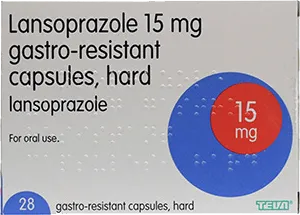
Images are for illustration purposes only.
Lansoprazole 15mg Capsules
From £12.99
Includes free private prescription
- A prescription-only medicine
- Treats indigestion, gastric ulcers, and erosive oesophagitis
- Contains benzimidazole
Available strengths:
Expected Delivery: Tuesday, 30 December 2025
Why choose Click Pharmacy?
- Rated 'Excellent' on Trustpilot
- Free Online Assessment
- Price Match Guarantee
GPhC Internet Pharmacy Registration
UK Pharmacy Registration Number 9011460
Lansoprazole Prices
| Strength | 28 Capsules | 56 Capsules |
|---|---|---|
| 15 mg | £12.99 | £19.99 |
| 30 mg | £14.99 | £21.99 |
Buy Lansoprazole online in the UK
You can order lansoprazole in the UK from our registered online pharmacy and clinic service. After you finish the medical assessment, one of our prescribers will check it. If your request is approved, we will send you it to you for next-day delivery.
About Lansoprazole
This medicine can help with digestion issues, heartburn and stomach sores. You can buy it as tablets or capsules.
Lansoprazole summary information
|
Type of medicine |
Acid reflux treatment |
|
Use |
Treats problems caused by too much stomach acid |
|
How it works |
Reduces stomach acid |
|
Active Ingredient |
Lansoprazole |
|
Directions of use |
Oral capsules, taken once daily |
|
Available form |
Capsules |
|
Available strengths |
15 mg, 30 mg |
|
Side effects |
Headaches, diarrhoea, stomach pain, constipation, nausea and vomiting |
|
Generic |
Yes |
This table is just a guide. Talk to your doctor before taking any medicine for heartburn.
How effective is Lansoprazole?
This medicine works well for heartburn, abdominal pain and GORD diseases. You will start to notice a difference after two or three days. Sometimes, it can take up to a month depending on the dose. But certain medicines can make it work less effectively. So you should talk to your doctor first.
How does Lansoprazole work?
The capsules target cells that produce gastric acid and block them. But they won’t start working until you swallow them.
Patient Information Leaflet
Always read the patient information leaflet before starting your treatment. The patient information can be found here.
What dose should I choose?
A single pack has 28 capsules. Each capsule has 15 or 30 mg of the active ingredient. An adult would usually take 15 mg a day for 4 weeks. But this can change depending on the person.
How should I take Lansoprazole?
You should take the capsules by mouth. Don’t chew or crush on them. If they’re hard to swallow, try sprinkling them on yoghurt or applesauce and eating them. You can also put the capsules in a bit of water (60 mL) and drink them. But make sure to consume the mixture right away. If you wait or prepare it in advance, the medicine won’t work.
No matter how old you are, you should always take this medicine 30 minutes before eating. This is because food can slow down its absorption. You may need to take the capsules once or twice a day. If after 14 days, the symptoms don’t go away, talk to your doctor.
What are the side effects of Lansoprazole?
Most people don’t have strong symptoms. But some may feel headaches, nausea, constipation and stomach pain. These symptoms usually go away after a while. Talk to your doctor if they last too long or get worse.
Some side effects can be serious. If you get them, go to the doctor right away.
-
Intense diarrhoea
-
Broken or cracked bones
-
Kidney pain
-
Red, itchy and peeling skin
-
Clumsiness
-
Seizures
-
Trouble breathing
-
Fast heart rate
These symptoms can happen if you take the medicine for more than three months. This is because your body is having a hard time absorbing minerals and vitamins. If you need urgent help, contact a health specialist at Click Pharmacy.
Discreet Delivery
Once your order has been approved, it will be dispatched via Royal mail. All orders are sent using a tracked and signed for service.
Delivery charges
Economy Delivery | £3.50 (Track 24). Delivered within 2-3 working days (Excludes Sundays and bank holidays).
Standard | £4.50 (Track 48). Delivered within 1-2 working days (Excludes Sundays and bank holidays).
Next Day Delivery Guaranteed before 1pm | £7.95. Delivered within 1 working day before 1pm (Excludes Sundays and bank holidays).
Find out more about our delivery service
Further information on return and refunds
Lansoprazole Reviews
Related Acid Reflux Treatment advice & articles
How it works
Order your Acid Reflux Treatment medication in a few clicks. Ordering from us is easy, fast and discreet.
Free Online Assessment
Answer a few simple questions about your health.
Choose Your Medication
Our prescribers will review and guide you to the right treatment.
Fast Delivery
Once approved, your treatment is dispatched discreet packaging by next day delivery.
Expected Delivery: Tuesday, 30 December 2025